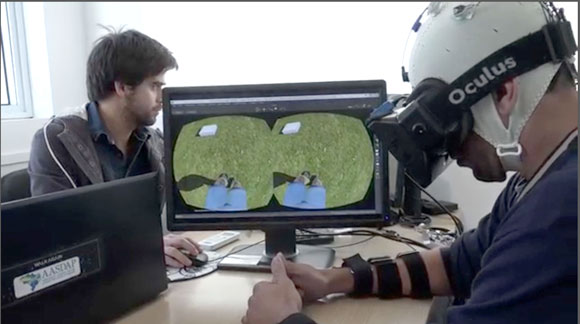international collaboration
See the following -
Brain-Machine Interface Helps Paraplegic Patients Regain Some Feeling
 Eight people who have spent years paralyzed from spinal cord injuries have regained partial sensation and muscle control in their lower limbs after training with brain-controlled robotics, according to a study published Aug. 11 in Scientific Reports. The patients used brain-machine interfaces, including a virtual reality system that used their own brain activity to simulate full control of their legs. Videos accompanying the study illustrate their progress. The research -- led by Duke University neuroscientist Miguel Nicolelis, M.D., Ph.D., as part of the Walk Again Project in São Paulo, Brazil -- offers promise for people with spinal cord injury, stroke and other conditions to regain strength, mobility and independence.
Eight people who have spent years paralyzed from spinal cord injuries have regained partial sensation and muscle control in their lower limbs after training with brain-controlled robotics, according to a study published Aug. 11 in Scientific Reports. The patients used brain-machine interfaces, including a virtual reality system that used their own brain activity to simulate full control of their legs. Videos accompanying the study illustrate their progress. The research -- led by Duke University neuroscientist Miguel Nicolelis, M.D., Ph.D., as part of the Walk Again Project in São Paulo, Brazil -- offers promise for people with spinal cord injury, stroke and other conditions to regain strength, mobility and independence.
- Login to post comments
Radiology Initiatives Illustrate Uses for Open Data and Open AI research
 Fans of data in health care often speculate about what clinicians and researchers could achieve by reducing friction in data sharing. What if we had easy access to group repositories, expert annotations and labels, robust and consistent metadata, and standards without inconsistencies? Since 2017, the Radiological Society of North America (RSNA) has been displaying a model for such data sharing. That year marked RSNA's first AI challenge. RSNA has worked since then to make the AI challenge an increasingly international collaboration. Organizers of each challenge curate and annotate medical imaging studies and ask the research community to come up with models to answer important questions.
Fans of data in health care often speculate about what clinicians and researchers could achieve by reducing friction in data sharing. What if we had easy access to group repositories, expert annotations and labels, robust and consistent metadata, and standards without inconsistencies? Since 2017, the Radiological Society of North America (RSNA) has been displaying a model for such data sharing. That year marked RSNA's first AI challenge. RSNA has worked since then to make the AI challenge an increasingly international collaboration. Organizers of each challenge curate and annotate medical imaging studies and ask the research community to come up with models to answer important questions.
- Login to post comments
Research to Help Fight Multi-Resistant Bacteria
 An international collaboration led by scientists from The University of Western Australia has uncovered the three-dimensional molecular structure of a protein, called EptA, which is responsible for multi-drug resistance in many disease-causing bacteria. Multi-drug resistance in bacteria has been identified as a major worldwide public health concern by the World Health Organization. Multi-drug resistant bacteria are responsible for approximately 700,000 deaths per year, a figure which the WHO says could reach 10 million by the year 2050...
An international collaboration led by scientists from The University of Western Australia has uncovered the three-dimensional molecular structure of a protein, called EptA, which is responsible for multi-drug resistance in many disease-causing bacteria. Multi-drug resistance in bacteria has been identified as a major worldwide public health concern by the World Health Organization. Multi-drug resistant bacteria are responsible for approximately 700,000 deaths per year, a figure which the WHO says could reach 10 million by the year 2050...
- Login to post comments